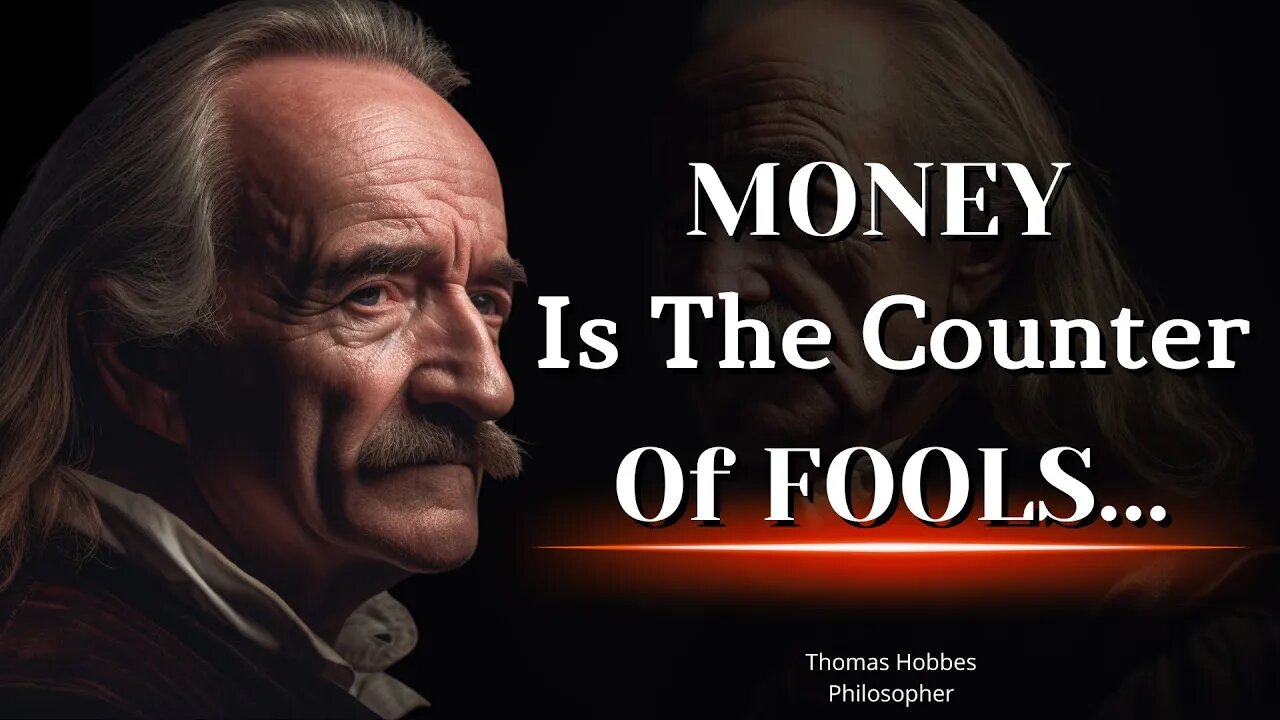Premium Only Content

Leviathan's Lessons: Thomas Hobbes Quotes for Modern Times.
Thomas Hobbes: The Philosopher of Social Contract
Thomas Hobbes, born on April 5, 1588, in Westport, Wiltshire, England, was a philosopher known for his influential contributions to political and social thought. He is best known for his work on the concept of the social contract, which had a profound impact on political philosophy and the understanding of government.
Hobbes was greatly influenced by the scientific and philosophical advancements of his time, particularly the works of Galileo Galilei and René Descartes. He sought to apply a similar methodical and rational approach to the study of politics and society.
In 1651, Hobbes published his seminal work, "Leviathan." In this book, he presented his political philosophy, which was grounded in a pessimistic view of human nature. Hobbes famously asserted that in the absence of a strong and centralized government, life in the state of nature would be "solitary, poor, nasty, brutish, and short." He argued that individuals, motivated by self-preservation, would enter into a social contract to create a sovereign authority to maintain order and security.
Hobbes' social contract theory posited that people willingly relinquish some of their individual freedoms and submit to the authority of a sovereign ruler in exchange for protection and the prevention of chaos. He believed that this sovereign authority, which he described as the "Leviathan," could be a monarchy, an aristocracy, or a democracy, but its primary purpose was to ensure peace and security.
Hobbes' views on human nature were central to his philosophy. He argued that humans were driven primarily by self-interest and a desire to avoid conflict and suffering. This pessimistic view of human nature contrasted sharply with earlier philosophers like John Locke and Jean-Jacques Rousseau, who held more optimistic views.
Thomas Hobbes' ideas had a profound and enduring impact on political philosophy. His concept of the social contract laid the groundwork for later Enlightenment thinkers and their exploration of government, individual rights, and the nature of authority. His work continues to be studied and debated in the fields of political science, philosophy, and sociology.
Thomas Hobbes passed away on December 4, 1679, in Derbyshire, England. His contributions to political thought, particularly his exploration of the social contract, remain essential in understanding the foundations of modern political theory and government.
#thomashobbesquotes #verbalvoyager
-
 20:10
20:10
CartierFamily
6 hours agoAndrew Schulz DESTROYS Charlamagne’s WOKE Meltdown on DOGE & Elon Musk!
13.8K40 -
 1:36:39
1:36:39
Redacted News
3 hours agoBOMBSHELL EPSTEIN SH*T SHOW JUST DROPPED ON WASHINGTON, WHAT IS THIS? | Redacted w Clayton Morris
109K173 -
 2:03:31
2:03:31
Revenge of the Cis
5 hours agoEpisode 1453: Fat & Fit
26.6K4 -
 2:38:12
2:38:12
The White House
6 hours agoPresident Trump Holds a Press Conference with Prime Minister Keir Starmer of the United Kingdom
115K38 -
 1:01:04
1:01:04
In The Litter Box w/ Jewels & Catturd
1 day agoDrain the Swamp! | In the Litter Box w/ Jewels & Catturd – Ep. 751 – 2/27/2025
71.6K33 -
 1:11:24
1:11:24
Dr. Drew
6 hours agoNEW: Cardiac Arrest In Healthy Young People After mRNA w/ Nicolas Hulscher – Ask Dr. Drew
56.7K28 -
 4:24:53
4:24:53
Right Side Broadcasting Network
10 hours agoLIVE REPLAY: President Trump and UK Prime Minister Starmer Meet and Hold a Press Conference 2/27/25
151K47 -
 2:12:33
2:12:33
Adam Carolla
2 days agoKamala Harris vs. Trump Wildfire Response + Jillian Michaels on Motherhood/Ayahuasca & Sperm Donors!
48.8K20 -
 4:18:28
4:18:28
Barry Cunningham
9 hours agoTRUMP DAILY BRIEFING: PRESIDENT TRUMP AND UK PRIME MINISTER STARMER HOLD PRESS CONFERENCE!
71.1K15 -
 1:44:47
1:44:47
The Quartering
6 hours agoEpstein Files RELEASED Today, Gene Hackman Mystery & Trump Vs Woke Reporters!
97.2K39